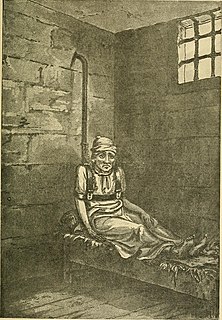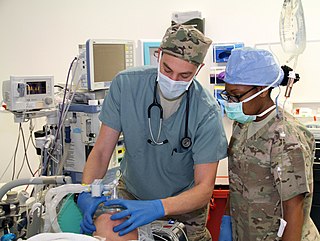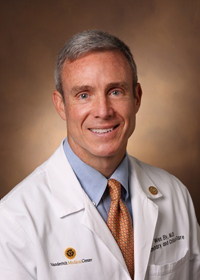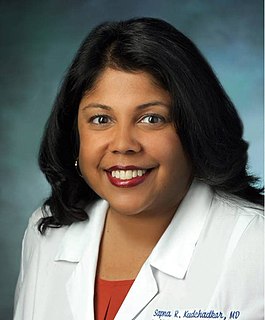
Delirium, also known as acute confusional state, is the organically caused decline from a previous baseline mental functioning that develops over a short period of time, typically hours to days. Delirium is a syndrome encompassing disturbances in attention, consciousness, and cognition. It may also involve other neurological deficits, such as psychomotor disturbances, impaired sleep-wake cycle, emotional disturbances, and perceptual disturbances, although these features are not required for diagnosis.
Mechanical ventilation, assisted ventilation or intermittent mandatory ventilation (IMV), is the medical term for artificial ventilation where mechanical means are used to assist or replace spontaneous breathing. This may involve a machine called a ventilator, or the breathing may be assisted manually by a suitably qualified professional, such as an anesthesiologist, registered nurse (RN), paramedic or other first responder, or in some parts of the United States, by a respiratory therapist (RT), by compressing a bag valve mask device.

Intensive care medicine, also called critical care medicine, is a medical specialty that deals with seriously or critically ill patients who have, are at risk of, or are recovering from conditions that may be life-threatening. It includes providing life support, invasive monitoring techniques, resuscitation, and end-of-life care. Doctors in this specialty are often called intensive care physicians, critical care physicians or intensivists.

Anesthesiology, anaesthesiology, anaesthesia or anaesthetics is the medical specialty concerned with the total perioperative care of patients before, during and after surgery. It encompasses anesthesia, intensive care medicine, critical emergency medicine, and pain medicine. A physician specialized in this field of medicine is called an anesthesiologist, anaesthesiologist or anaesthetist, depending on the country. Nurses that specialize in anesthesia are called CRNA, Certified Registered Nurse Anesthetist, or Nurse anesthetist.

Geriatrics, or geriatric medicine, is a specialty that focuses on health care of elderly people. It aims to promote health by preventing and treating diseases and disabilities in older adults. There is no set age at which patients may be under the care of a geriatrician, or geriatric physician, a physician who specializes in the care of elderly people. Rather, this decision is determined by the individual patient's needs, and the availability of a specialist. It is important to note the difference between geriatrics, the care of aged people, and gerontology, which is the study of the aging process itself. The term geriatrics comes from the Greek γέρων geron meaning "old man", and ιατρός iatros meaning "healer". However, geriatrics is sometimes called medical gerontology.
APACHE II is a severity-of-disease classification system, one of several ICU scoring systems. It is applied within 24 hours of admission of a patient to an intensive care unit (ICU): an integer score from 0 to 71 is computed based on several measurements; higher scores correspond to more severe disease and a higher risk of death. The first APACHE model was presented by Knaus et al. in 1981.

A neonatal intensive care unit (NICU), also known as an intensive care nursery (ICN), is an intensive care unit (ICU) specializing in the care of ill or premature newborn infants. Neonatal refers to the first 28 days of life. Neonatal care, as known as specialized nurseries or intensive care, has been around since the 1960s.

Kwong Wah Hospital is a 1,141-bed public district general hospital in Yau Ma Tei, Hong Kong. Located on 25 Waterloo Road, the hospital was founded by the Tung Wah Group in 1911, and managed by the Hospital Authority since 1991. It provides a full range of medical services to the population of West Kowloon and Wong Tai Sin. It is Kowloon West Cluster's major acute teaching hospital, and also a Neurosurgical and Antenatal Diagnosis referral centre. The Hospital has established various clinical centers, including Lai Kwok Wing Urology Centre, Minimally Invasive Surgery Training Centre and Chan Feng Men Ling Cardiac Centre. There are integrated Breast Centre and Dr Stephen Chow Chun-kay Assisted Reproduction Centre. It has established a Community Based Geriatric Service, Respiratory Care Unit, Acute Stroke Unit, TWGHs BOCHK Diabetes Centre, Wong Wha San Renal Memorial Centre, and a Nuclear Medicine site. Kwong Wah Hospital is also a pioneer in Integrative Chinese and Western Medicine. TWGHs has established TWGHs Wilson T S Wang Integrated Chinese and Western Medicine Treatment Centre in Kwong Wah. The hospital has participated through joint consultation for designated diseases under protocols which developed by both Chinese Medicine and Western Medicine practitioners.
Ventilator-associated pneumonia (VAP) is a type of lung infection that occurs in people who are on mechanical ventilation breathing machines in hospitals. As such, VAP typically affects critically ill persons that are in an intensive care unit (ICU). VAP is a major source of increased illness and death. Persons with VAP have increased lengths of ICU hospitalization and have up to a 20–30% death rate. The diagnosis of VAP varies among hospitals and providers but usually requires a new infiltrate on chest x-ray plus two or more other factors. These factors include temperatures of >38 °C or <36 °C, a white blood cell count of >12 × 109/ml, purulent secretions from the airways in the lung, and/or reduction in gas exchange.

An intensive care unit (ICU), also known as an intensive therapy unit or intensive treatment unit (ITU) or critical care unit (CCU), is a special department of a hospital or health care facility that provides intensive care medicine.

Critical care nursing is the field of nursing with a focus on the utmost care of the critically ill or unstable patients following extensive injury, surgery or life threatening diseases. Critical care nurses can be found working in a wide variety of environments and specialties, such as general intensive care units, medical intensive care units, surgical intensive care units, trauma intensive care units, coronary care units, cardiothoracic intensive care units, burns unit, paediatrics and some trauma center emergency departments. These specialists generally take care of critically ill patients who require mechanical ventilation by way of endotracheal intubation and/or titratable vasoactive intravenous medications.
The Critical Care Air Transport Team (CCATT) concept dates from 1988, when Col. P.K. Carlton and Maj. J. Chris Farmer originated the development of this program while stationed at U.S. Air Force Hospital Scott, Scott Air Force Base, Illinois. Dr. Carlton was the Hospital Commander, and Dr. Farmer was a staff intensivist. The program was developed because of an inability to transport and care for a patient who became critically ill during a trans-Atlantic air evac mission in a C-141. They envisioned a highly portable intensive care unit (ICU) with sophisticated capabilities, carried in backpacks, that would match on-the-ground ICU functionality.
A stress ulcer is a single or multiple mucosal defect which can become complicated by upper gastrointestinal bleeding or physiologic stress. Ordinary peptic ulcers are found commonly in the gastric antrum and the duodenum whereas stress ulcers are found commonly in fundic mucosa and can be located anywhere within the stomach and proximal duodenum.
Geriatric medicine, as a speciality, was introduced in Egypt in 1982, and in 1984 a Geriatrics and Gerontology unit in Ain Shams University Faculty of Medicine was established.
The Society of Critical Care Medicine (SCCM) is the largest non-profit medical organization in the practice of critical care. SCCM was established in 1970 and is an independently incorporated, international, educational and scientific society based in the United States. Its members are multi-professional health professionals providing care to critically ill and injured patients, and SCCM is the only organization that represents all professional components of the critical care team. The Society supports research and education, and advocates on issues related to critical care.

A pediatric intensive care unit, usually abbreviated to PICU, is an area within a hospital specializing in the care of critically ill infants, children, teenagers, and young adults aged 0-21. A PICU is typically directed by one or more pediatric intensivists or PICU consultants and staffed by doctors, nurses, and respiratory therapists who are specially trained and experienced in pediatric intensive care. The unit may also have nurse practitioners, physician assistants, physiotherapists, social workers, child life specialists, and clerks on staff, although this varies widely depending on geographic location. The ratio of professionals to patients is generally higher than in other areas of the hospital, reflecting the acuity of PICU patients and the risk of life-threatening complications. Complex technology and equipment is often in use, particularly mechanical ventilators and patient monitoring systems. Consequently, PICUs have a larger operating budget than many other departments within the hospital.

Herzog Hospital is a geriatric-psychiatric hospital in West Jerusalem. It is the third largest hospital in the city. Herzog Hospital specializes in nursing care for the elderly. The director-general of the hospital is Dr. Yehezkel Caine.

Eugene Wesley Ely Jr. is an American physician and professor of medicine as the Grant W. Liddle Endowed Chair at Vanderbilt University School of Medicine. He is conducting research as a geriatric intensivist in the Division of Pulmonary and Critical Care Medicine and the Center for Health Services Research at Vanderbilt University Medical Center. He is also the associate director of research at the Tennessee Valley Geriatric Research Education and Clinical Center (GRECC), part of the U.S. Department of Veterans Affairs.

Sapna Ravi Kudchadkar is an American critical care physician and anesthesiologist. She is an Associate professor of anesthesiology and critical care medicine, pediatrics and physical medicine and rehabilitation at the Johns Hopkins School of Medicine.












